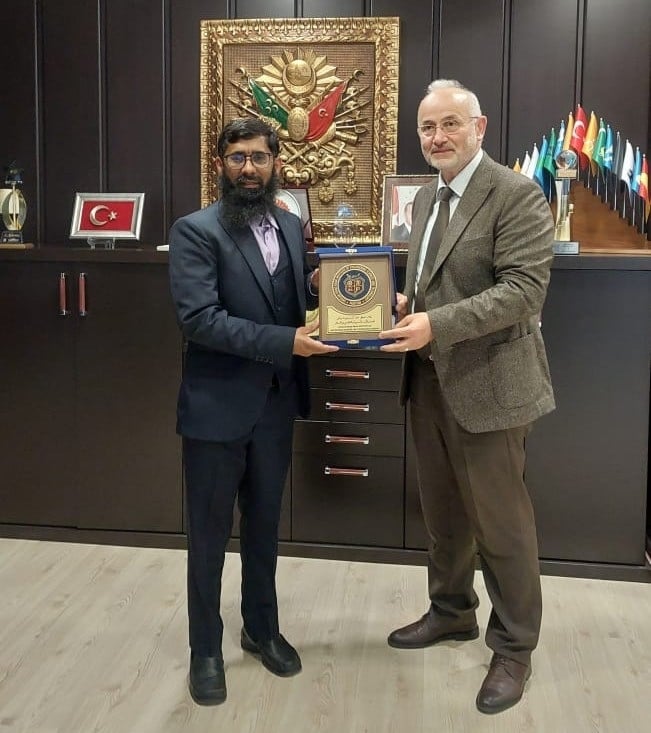Pakistani, Turkish academics to ‘solve common problems’ using artificial intelligence
Ghulam Ishaq Khan Institute of Engineering Sciences and Technology and Turkiye's Ondokuz Mayis University sign MoU

Pakistani and Turkish scholars and academics have initiated joint projects to “solve common problems” using emerging technologies, including artificial intelligence (AI).
The joint projects will be carried out under an agreement between Pakistan’s Ghulam Ishaq Khan Institute of Engineering Sciences and Technology (GIKI) and Ondokuz Mayis University in the Black Sea province of Samsun, Turkiye.
In January, the two sides virtually signed a memorandum of understanding (MoU) which resulted in the first formal visit to the Turkish university by Masroor Hussain, head of GIKI’s Computer Engineering and Data Science Department.

Prof. Masroor Hussain of Ghulam Ishaq Khan Institute of Engineering Sciences and Technology with Prof. Dr. Yavuz Unal, rector of 19 Mayis University, Samsun. PHOTO: ANADOLU AGENCY
“It was during this visit the two institutions identified four to five potential collaborative projects that leverage AI in computer and agricultural engineering,” Hussain told Anadolu over the phone.
The joint collaboration project among Pakistani and Turkish academics and scientists was initiated by Agha Adeel Saadat, an American of Pakistani origin.
Agha, along with his two other friends, had visited several cities and provinces in Turkiye before reaching the 19 May University to lay the foundation for university collaboration.
"This partnership," Hussain emphasised, "offers us exciting opportunities for international collaboration and the development of commercially viable solutions to address local challenges."
Speaking to Anadolu from Samsun, Turkiye, Ilkay Erken, director of international collaborations at Ondokuz Mayis University, said that the MoU was an “umbrella protocol which covers everything.”
“Student and faculty exchanges across the departments … as it is important for us to get experience from them (Pakistan) and share our experiences with them,” said Erken, a trained historian.
Erken said: “We are planning to go for an exchange of students and academic staff from coming academic session in September and we expect some results from next year.”
From tech to cultural ties
The US-based Agha said the digital age has “connected us … in understanding cultures and traditions.”
“While Asia focuses on road and rail connectivity, people-to-people connections are crucial. Collaboration in science and technology is a powerful way to achieve this,” Agha explained.
The emerging technologies allow Pakistani and Turkish academia to “partner to solve common problems,” he said.
According to Hussain, the Pakistani scholar, the collaboration will culminate in the development of Large Language Models (LLMs).
It “enables seamless digital translation between Urdu and Turkish (languages),” Hussain said.
"These LLMs will bridge the language barrier, which is the primary hurdle we currently face," he concluded.
Agha agreed and said: “This collaboration will not only address shared challenges but also strengthen cultural and academic ties, fostering a more integrated and harmonious regional community.”
Read also: Pakistan, Türkiye set $5 billion trade goal
The two sides are expecting that their projects will be funded by the universities besides support by the Scientific and Technological Research Council of Türkiye (TUBITAK) and the Pakistan Science Foundation.
On why the Turkish university located along the Black Sea and the Pakistani institute were picked for collaboration, Agha said: “Connectivity between the Black Sea region and Pakistan is limited, but the people are hospitable and share cultural values with Pakistan.”
“This made selecting Ondokuz Mayis University in Samsun easy.
“Turkiye and Pakistan have so many collaborative initiatives at the government level but extending this collaboration at the university level will expedite the scientific research and help the local manufacturing industry to build commercial products using this research,” he added.
Erken said the collaboration with the Pakistani university “helps us remember common historical stories” of the two peoples.
Agha said he and his friends are working to expand similar joint projects with universities in Central Asia.
“To begin with, we are working with some friends in Uzbekistan,” he said.



















COMMENTS
Comments are moderated and generally will be posted if they are on-topic and not abusive.
For more information, please see our Comments FAQ